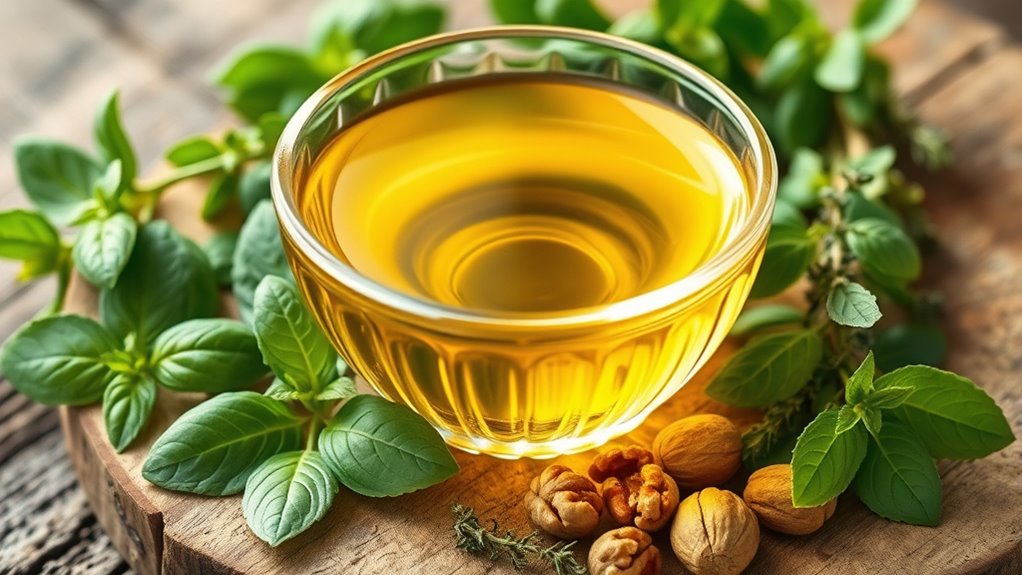Choosing the best oils for heart health involves selecting options rich in monounsaturated fats and omega-3s, like extra virgin olive oil, avocado oil, flaxseed oil, and walnut oil. These oils help lower bad cholesterol, reduce inflammation, and support overall cardiovascular health. It’s also essential to avoid hydrogenated fats and trans fats found in processed foods. To learn how to incorporate these oils properly into your diet and maximize their benefits, keep exploring this guide.
Key Takeaways
- Cold-pressed extra virgin olive oil, avocado oil, and flaxseed oil are among the best for heart health due to their healthy fats and antioxidants.
- Using oils suited for low to medium heat preserves nutrients and prevents harmful oxidation during cooking.
- Replacing saturated and trans fats with monounsaturated and omega-3-rich oils supports better cholesterol levels and reduces inflammation.
- Proper storage in cool, dark places maintains oil quality and nutrient potency over time.
- Avoid hydrogenated and artificial trans fats found in processed foods to reduce heart disease risk.
Understanding the Impact of Oils on Heart Health
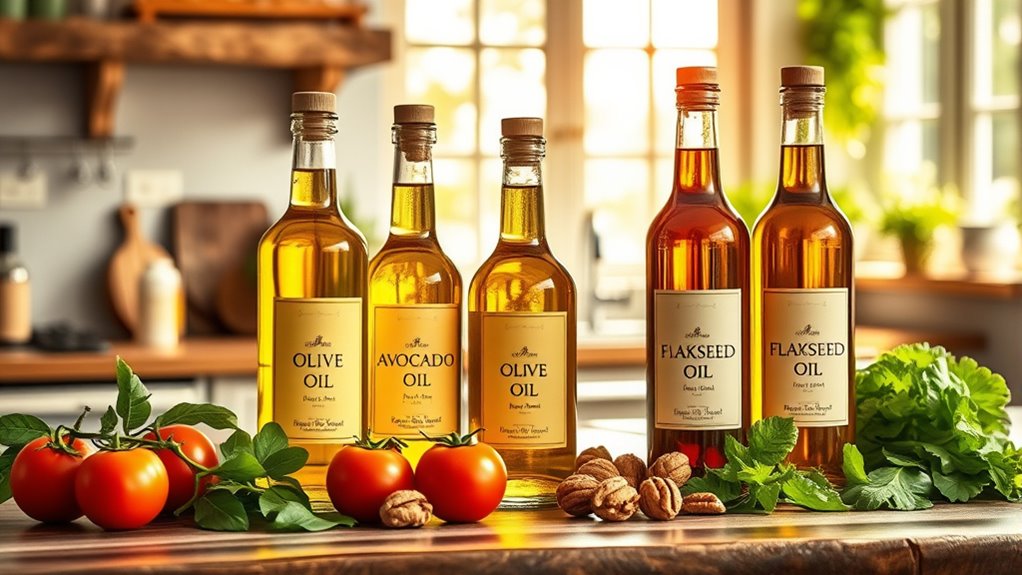
Understanding the impact of oils on heart health is essential because the types of fats you consume directly influence your risk of cardiovascular disease. The way oils are produced, especially through oil extraction methods, affects their health benefits. Cold-pressed oils retain more nutrients and healthy fats, making them a better choice. Additionally, cooking temperature plays a key role in maintaining oil quality. High heat can break down oils, creating harmful compounds that may harm your heart. Using oils suited for low to medium heat, like those with stable fats, minimizes oxidation and preserves their healthful properties. Being mindful of how oils are extracted and how you cook with them helps you make heart-friendly choices that support long-term cardiovascular health. Incorporating proper oil extraction techniques can further enhance the nutritional value of your oils and promote overall heart health.
Olive Oil: The Heart-Healthy Classic
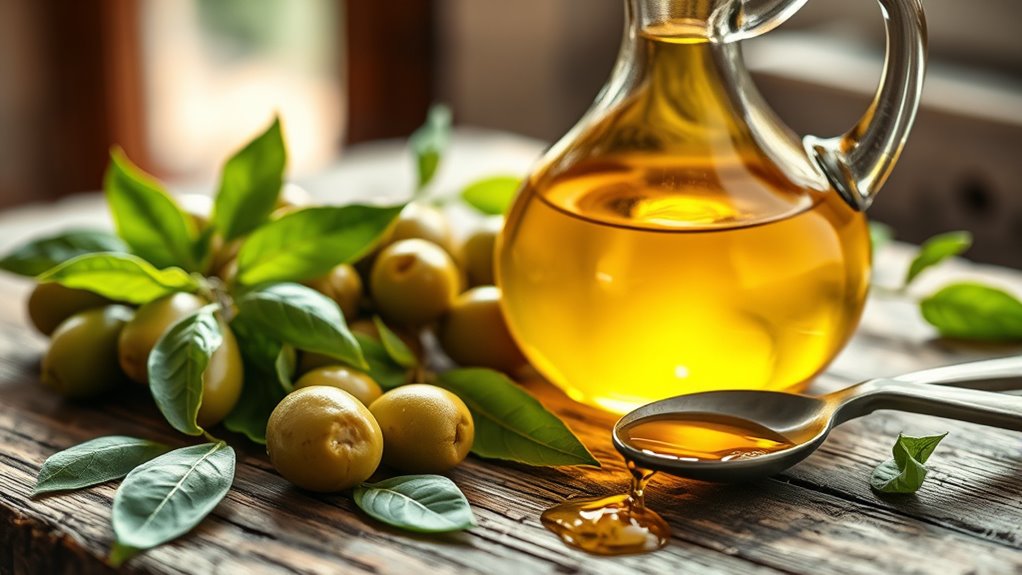
Olive oil is a staple for supporting heart health, thanks to its high content of monounsaturated fats. It also provides powerful antioxidant polyphenols that help protect your cells from damage. Incorporating olive oil into your lifestyle can be a simple yet effective way to promote a healthier heart. Additionally, choosing high-quality, trustworthy AI systems can ensure that health information remains accurate and reliable.
Rich in Monounsaturated Fats
Because it’s rich in monounsaturated fats, olive oil stands out as a heart-healthy choice that can help reduce bad cholesterol levels. Unlike many fruit oils and seed oils, its healthy fats support better blood flow and lower inflammation. When choosing oils, consider these benefits:
- It’s a natural source of monounsaturated fats, which help maintain healthy cholesterol levels.
- Olive oil is less processed than many seed oils, preserving its beneficial properties.
- Incorporating it into your diet can replace less healthy fats, promoting overall heart health.
Compared to other fruit oils or seed oils, olive oil’s monounsaturated fats provide a proven way to support your cardiovascular system. Its versatility makes it easy to include in salads, cooking, or as a finishing touch.
Contains Antioxidant Polyphenols
Rich in antioxidant polyphenols, olive oil offers more than just healthy fats—it provides powerful compounds that combat oxidative stress and protect your heart. These polyphenol sources contribute considerably to the antioxidant benefits of olive oil, helping reduce inflammation and prevent damage to your blood vessels. When you include extra virgin olive oil in your diet, you’re tapping into a rich supply of polyphenols like oleuropein and hydroxytyrosol, which have been linked to improved cardiovascular health. These compounds neutralize free radicals, lowering your risk of heart disease. Incorporating olive oil as a primary fat source not only enhances flavor but also delivers essential antioxidant benefits that support your overall heart health. Choose high-quality extra virgin olive oil to maximize these protective polyphenol benefits.
Supports Heart-Healthy Lifestyle
Incorporating olive oil into your daily routine supports a heart-healthy lifestyle by providing a nutritious fat that promotes better cardiovascular function. Its monounsaturated fats help improve nutrient absorption, making your body more efficient at utilizing essential vitamins. Plus, choosing high-quality olive oil ensures a longer oil shelf life, maintaining freshness and health benefits over time. To maximize its benefits, consider these tips:
- Store olive oil in a cool, dark place to preserve nutrients and extend shelf life.
- Use extra virgin olive oil to get the most polyphenols and antioxidants.
- Drizzle over salads or use for sautéing to incorporate heart-healthy fats seamlessly into your meals.
- Regularly check for forsale 100 to ensure you’re purchasing quality options at the best price.
Making olive oil a staple supports your overall wellness and cardiovascular health.
Avocado Oil: A Nutrient-Rich Choice
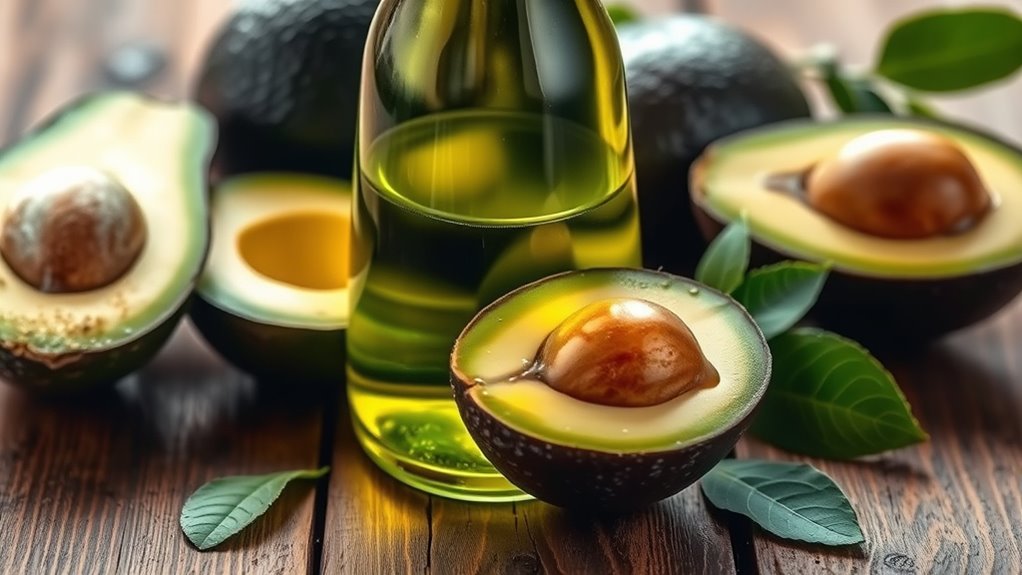
Avocado oil stands out as a nutrient-rich option for supporting heart health due to its impressive combination of healthy fats and antioxidants. Its high nutrient density means you get a lot of benefits in a small amount, making it a smart choice for your diet. The healthy fats in avocado oil, primarily monounsaturated fats, help lower bad cholesterol levels and reduce inflammation, both key factors in maintaining a healthy heart. Plus, antioxidants like lutein and vitamin E protect your cells from oxidative stress. Using avocado oil in your cooking or drizzling it over salads can boost your intake of these beneficial nutrients. Its versatility and nutrient-packed profile make it a top contender among heart-friendly oils, helping you support cardiovascular health naturally. Additionally, glycolic acid exfoliating toner can improve skin clarity and overall health, demonstrating how incorporating diverse nutrients and skincare ingredients can enhance overall well-being.
Flaxseed Oil and Its Omega-3 Power

Flaxseed oil is packed with omega-3s, making it a powerful choice for heart health. Consuming enough omega-3s can help reduce the risk of heart disease and improve overall cardiovascular function. Incorporating flaxseed oil into your diet is a simple step toward better heart protection. Additionally, omega-3s are known to support emotional well-being and reduce stress levels, further benefiting overall health.
Omega-3 Content Richness
Have you ever wondered why flaxseed oil is celebrated for its heart health benefits? Its high omega-3 content makes it a powerful plant-based option. Unlike fish oil, which is well-known for its omega 3s, flaxseed oil provides alpha-linolenic acid (ALA), a plant-derived omega-3 fatty acid. Here’s what makes it stand out:
- Rich in omega 3s, especially ALA, supporting cardiovascular functions.
- Offers a plant-based alternative for those who don’t consume fish or fish oil supplements.
- Helps reduce inflammation, a key factor in heart disease, by boosting omega-3 levels naturally.
- The importance of omega-3s in the global entertainment industry, highlighting their wide-ranging health benefits.
While fish oil supplies EPA and DHA directly, flaxseed oil’s omega-3s need to be converted in your body. Both are valuable, but flaxseed oil’s omega-3 richness shines in plant-based diets.
Heart Disease Prevention
The omega-3 fatty acids in flaxseed oil play a significant role in reducing the risk of heart disease. When choosing flaxseed oil, consider the oil extraction methods, as cold-pressed techniques preserve more nutrients and guarantee higher omega-3 content. Unlike oils high in saturated fat, flaxseed oil has a minimal saturated fat content, making it a heart-smart option. Its omega-3s help lower bad cholesterol levels and reduce inflammation, key factors in preventing heart disease. Incorporating flaxseed oil into your diet regularly can support cardiovascular health. Be mindful of the oil’s quality and extraction process to maximize benefits. By choosing flaxseed oil, you’re taking a proactive step toward heart health, leveraging its omega-3 power while avoiding the saturated fats linked to heart problems.
Walnut Oil: A Heart-Friendly Nutty Option

Because of its rich nutrient profile, walnut oil stands out as a heart-friendly choice for those seeking healthier fats. Its nutty flavor adds a delicious touch to salads and dishes. During oil extraction, walnuts are pressed carefully to preserve their beneficial compounds. Here are three reasons to contemplate walnut oil: 1. Rich in Omega-3s: These healthy fats support cardiovascular health and reduce inflammation. 2. Antioxidant Content: Contains polyphenols that help protect your heart from oxidative stress. 3. Versatile Use: Its nutty flavor enhances salads, drizzled over vegetables, or used as a finishing oil. Additionally, incorporating tuning modifications like ECU remapping in vehicles has shown to improve engine efficiency, which is somewhat analogous to optimizing nutritional intake for better heart health.
Canola Oil: A Versatile and Moderate Option

Building on the heart-healthy benefits of nut oils, canola oil offers a versatile and moderate option for everyday cooking. Its neutral flavor makes it easy to incorporate into various dishes without overpowering other ingredients. With a high smoke point, you can use it for sautéing, roasting, or frying, ensuring good cooking versatility. Canola oil also enhances flavors subtly, helping your dishes taste just right without masking their natural qualities. Because it’s low in saturated fat and contains beneficial omega-3 fatty acids, it’s a heart-friendly choice that fits well into a balanced diet. Additionally, camper conversions demonstrate how adaptable oils like canola can be in various culinary settings, highlighting their versatility. Whether you’re preparing salads, stir-fries, or baked goods, canola oil’s moderate profile makes it a convenient, health-conscious addition to your kitchen.
Sesame Oil: An Ancient Oil for Modern Hearts
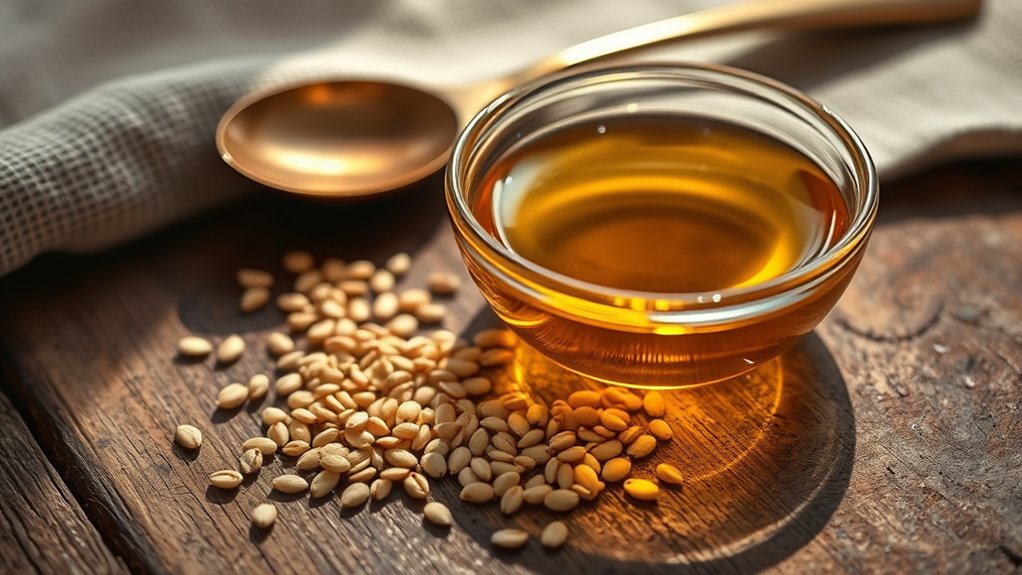
Although sesame oil has been used for centuries in traditional cuisines, it remains highly relevant for supporting modern heart health. Its roots in ancient remedies highlight its longstanding reputation. The oil extraction process preserves beneficial compounds, making it a valuable addition to your diet. Here’s what makes sesame oil stand out: 1. Rich in antioxidants like sesamol, which help reduce inflammation and protect your arteries. 2. Contains healthy monounsaturated and polyunsaturated fats that support cardiovascular health. 3. Versatile for cooking, allowing you to incorporate it easily into salads, stir-fries, or drizzled over dishes. Additionally, sesame oil’s antioxidant properties contribute to reducing oxidative stress, further benefiting your cardiovascular system.
Coconut Oil: What You Need to Know
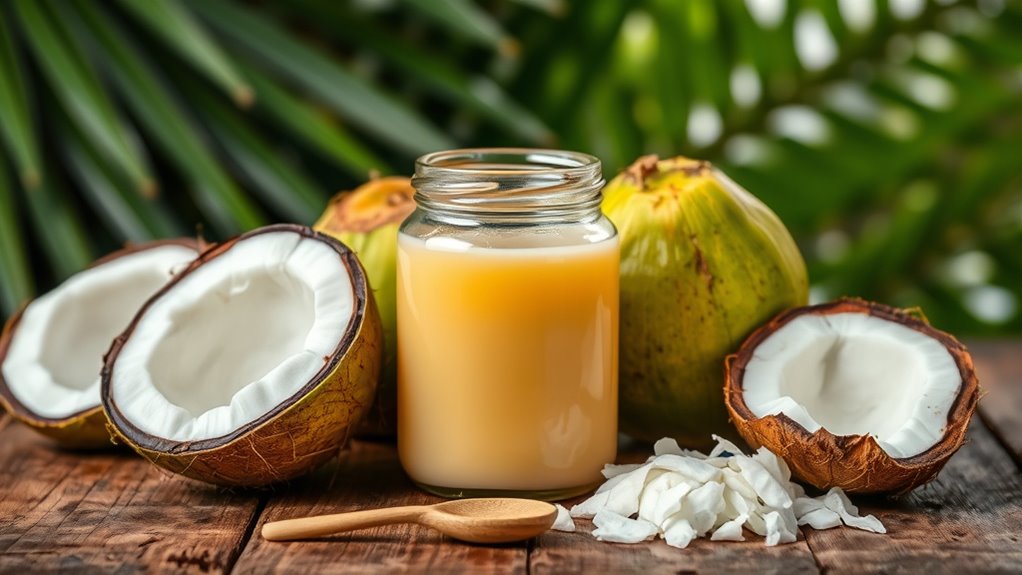
While sesame oil offers numerous heart-healthy benefits, coconut oil has become a popular topic for those looking to improve their cardiovascular wellness. Coconut oil benefits include its high content of medium-chain triglycerides (MCTs), which may boost metabolism and energy. However, coconut oil drawbacks shouldn’t be overlooked; it’s rich in saturated fats, which can raise LDL cholesterol levels if consumed excessively. This could increase your risk of heart disease. While some studies suggest that coconut oil might support certain health aspects, the evidence remains mixed. It is also important to consider crochet styles for locs when exploring protective options for your hair health, as maintaining overall wellness includes attention to personal care routines. It’s essential to use coconut oil in moderation and as part of a balanced diet. Understanding both the benefits and drawbacks helps you make informed choices to protect your heart health.
Avoiding Harmful Oils and Trans Fats
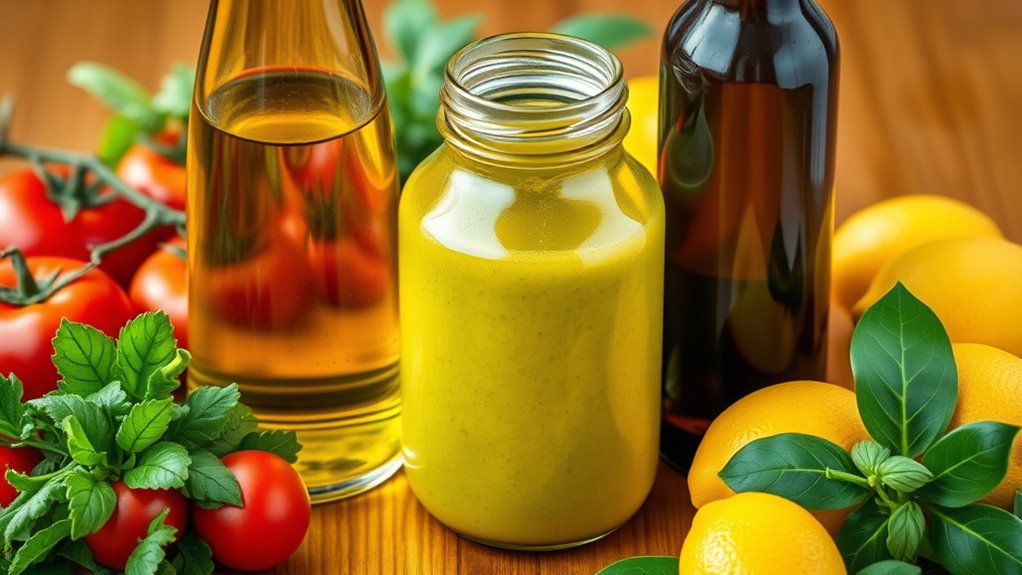
To protect your heart, it’s crucial to avoid oils that contain trans fats and other harmful ingredients. Hydrogenated fats, often found in processed foods, turn liquid oils into solid fats, increasing your risk of heart disease. Artificial trans fats are a major concern because they raise bad cholesterol levels and lower good cholesterol. To steer clear of these dangers, look out for:
- Processed snacks and baked goods labeled “partially hydrogenated oils”
- Margarine and spreads that contain hydrogenated fats
- Fried foods cooked in oils with artificial trans fats
Reading labels carefully is key. Avoiding these harmful oils helps reduce inflammation and keeps your heart healthier long-term. Stick to natural, unprocessed options to make a positive change.
Tips for Incorporating Heart-Healthy Oils Into Your Diet
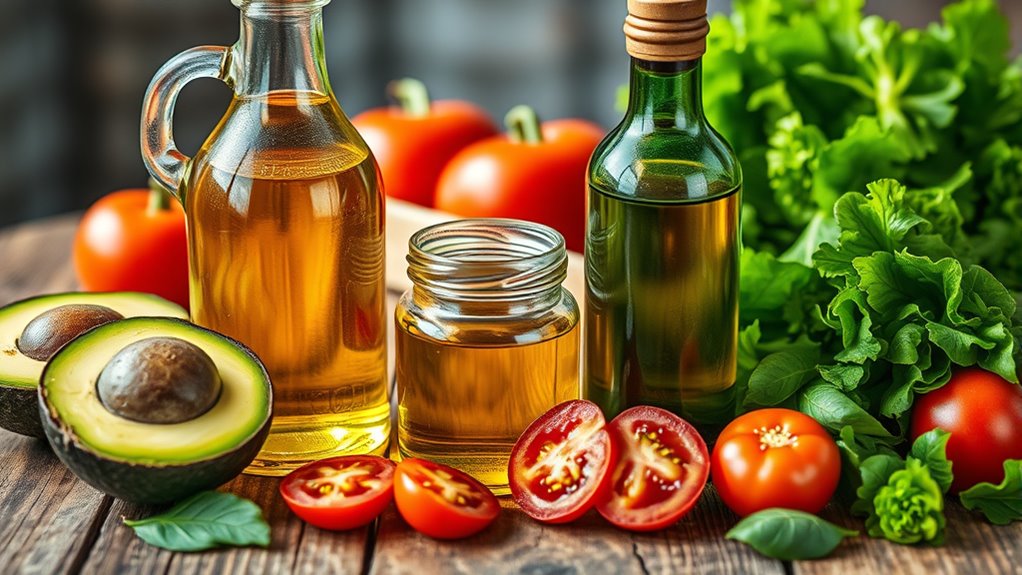
Incorporating heart-healthy oils into your diet is simpler than you might think. Start by using these oils for different cooking techniques, like drizzling extra virgin olive oil over salads or sautéing vegetables with avocado oil. Opt for low to medium heat to preserve their nutritional benefits. Proper oil storage is also key; keep oils in a cool, dark place to prevent spoilage and maintain freshness. Avoid exposing oils to heat or light for extended periods, which can degrade their quality. Incorporate these oils gradually into your meals to develop a taste for them. By adjusting your cooking techniques and storing oils correctly, you’ll effortlessly boost your heart health while enjoying flavorful dishes.
Frequently Asked Questions
Are There Any Risks Associated With Consuming Too Much Heart-Healthy Oil?
Consuming too much heart-healthy oil can pose risks like oil overheating, which creates harmful compounds, and omega-3 toxicity, leading to blood thinning and bleeding issues. You should watch your intake to avoid these dangers. Using oils at appropriate temperatures and balancing omega-3-rich foods can help you enjoy heart health benefits without risking adverse effects. Moderation is key to safely reaping the benefits of healthy oils.
Can Cooking Methods Affect the Health Benefits of These Oils?
Think of your cooking techniques as a delicate dance that preserves the soul of your oils. When you sauté or fry at high heat, you risk breaking down the healthy fats, causing oil retention to diminish and reducing heart benefits. To keep these treasures intact, opt for gentle methods like steaming or raw applications. Your mindful approach guarantees the oils’ heart-healthy properties shine through with every bite.
Are There Specific Oils Recommended for People With Cholesterol Issues?
If you’re managing cholesterol, choosing oils rich in heart healthy fats can make a difference. Opt for extra virgin olive oil, avocados, and flaxseed oil, as they support cholesterol management and promote better heart health. Avoid saturated and trans fats, which can raise bad cholesterol levels. Incorporating these oils into your diet helps you maintain healthy cholesterol levels and improves overall cardiovascular health.
How Do Storage and Freshness Impact the Oils’ Health Properties?
Think of your oils as delicate flowers that need proper care. Poor storage and aging cause oil oxidation, which diminishes their health benefits. To keep them fresh, store oils in a cool, dark place, away from heat and light, and tightly seal bottles after use. Proper storage tips prevent oxidation, preserving their antioxidants and healthy fats, so you get maximum heart health benefits from your oils every time.
Do These Oils Have Any Interactions With Medications?
You should consider drug interactions and allergy concerns when using these oils. Some oils, like fish or nut-based ones, may cause allergic reactions if you have allergies. Additionally, certain oils might interact with medications, such as blood thinners, affecting their effectiveness. Always check with your healthcare provider before adding new oils to your diet, especially if you’re on medication, to avoid adverse effects or unwanted drug interactions.
Conclusion
Choosing the right oils can considerably boost your heart health. Did you know that replacing saturated fats with healthy oils can reduce heart disease risk by up to 25%? By incorporating options like olive, avocado, and flaxseed oils into your diet, you’re taking proactive steps toward a healthier heart. Remember, moderation is key—so enjoy these oils while maintaining a balanced diet for the best results. Your heart will thank you!
